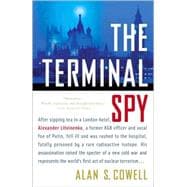
What is included with this book?
Alan S. Cowell was the London bureau chief of the New York Times when the events narrated in this book reached their climax. Previously, Cowell served as a correspondent for Reuters and the New York Times in Europe, the Middle East, and Africa. He has been based in twelve capitals and reported the news from around ninety countries and territories. Cowell is married and has three children. He is now based in Paris.
| Author's Note | p. ix |
| Dramatis Personae | p. xi |
| Prologue | p. 1 |
| Broken Homes, Broken Empire | p. 17 |
| Poor Man, Rich Man | p. 39 |
| Acolytes | p. 66 |
| Renegade | p. 81 |
| War Stories | p. 96 |
| From Russia With Stealth | p. 122 |
| Siloviki | p. 146 |
| Giled Exiles | p. 190 |
| Crown Protection? | p. 217 |
| A Rolodex To Die for | p. 235 |
| Poison and PR | p. 260 |
| Invisible Assassin | p. 292 |
| The Polonium Trail | p. 324 |
| Hit Men Or Fall Guys? | p. 374 |
| Putin's Doppelgänger | p. 392 |
| Epilogue | p. 422 |
| Acknowledgments | p. 425 |
| Notes and Sources | p. 427 |
| Select Bibliography | p. 431 |
| Table of Contents provided by Ingram. All Rights Reserved. |
The New copy of this book will include any supplemental materials advertised. Please check the title of the book to determine if it should include any access cards, study guides, lab manuals, CDs, etc.
The Used, Rental and eBook copies of this book are not guaranteed to include any supplemental materials. Typically, only the book itself is included. This is true even if the title states it includes any access cards, study guides, lab manuals, CDs, etc.
Excerpted from The Terminal Spy: After sipping tea in a London hotel, Alexander Litvinenko, a former KGB officer and vocal foe of the Kremlin, fell ill and was rushed to the hospital, Fatally by Alan Cowell
All rights reserved by the original copyright owners. Excerpts are provided for display purposes only and may not be reproduced, reprinted or distributed without the written permission of the publisher.